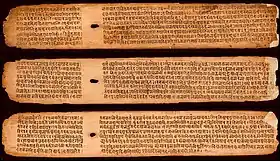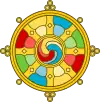Chandragomin
Chandragomin (Skt. Candragomin) was an Indian Buddhist lay scholar who the Tibetan tradition believes challenged Chandrakirti. According to the Nepalese tradition, Chandragomin's student was Ratnakirti. Chandragomin was a teacher at Nalanda Monastic University during the 7th century.[1] It is unclear when Chandragomin lived, with estimates ranging between 5th to 7th-century CE,[2][3] but his position at Nalanda signifies he lived during the 7th century.
_Chandragomin_LACMA_AC1992.208.2_(1_of_5).jpg.webp)

In the Buddhist records, Chandragomin is described as the one who debated Candrakīrti (Devanagari: चन्द्रकीर्ति, Tib. Dawa Drakpa) the Arya Tripitaka Master Shramana who was the Khenpo at Nalanda Mahāvihāra Monastery. Their debate was said to have continued for many years. Chandragomin held the Chittamatra (consciousness-only or Yogachara school) view, and Chandrakirti gave his interpretation of Nāgārjuna's view, eventually creating a new school of Madhyamaka known as Prasangika. This Nalanda tradition school is known as Prāsaṅgika Madhyamaka or rendered in English as the "Consequentialist" or "Dialecticist" school.
According to Thrangu Rinpoche, Chandragomin was slow in the debate but always had the right answers because each time a question was posed by Chandrakirti, Chandragomin would insist on giving the answer the next day after praying to Avalokiteshvara who would tell him the right answer. [4]
Major works
| Part of a series on |
| Tibetan Buddhism |
|---|
 |
- Chadragomin's writings include Shisyalekha or 'Letter to a Disciple' (published by Dharma Publishing as 'Invitation to Enlightenment' ISBN 0-89800-298-2)
- 'Twenty Verses on the Bodhisattva Vow'.[5]
- Translated from the original Buddhist Hybrid Sanskrit into Tibetan is Chandragomin's 'Shurangama Mantra Sadhana' (Tibetan canon Tengyur Karchag Phangthangma Toh 3096, Toh 593/2/1). It is titled Sarvatathāgataoṣṇīṣaśitātapatrā-nāmāparājitā-mahāpratyangirā-mahāvidyārājñī-nāma-dhāraṇī; Tibetan name is ['phags pa] De bshin gshegs pa'i gtsug tor nas byung ba'i gdugs dkar po can gshan gyi mi thub pa phir bzlog pa chen mo mchog tu grub pa shes bya ba'i gzungs.
Quote
Peerless king of physicians, guru of the world,
Totally faultless one, source of virtuous qualities,
Having visualised you, 0 refuge, I, always ill,
Shall confess, describing my changes of fault.
...
With whatever high mind is appropriate,
Abiding in whatever calm state is appropriate,
Who pacifies all the faults in all the modes,
Whatever the Lord may be, that I salute.
Praise in Confession (http://www.bodhicitta.net/Chandragomin%27s%20Praises.htm)
See also
References
- Khenchen Palden Sherab Rinpoche, Illuminating the Path, pg 187-188. Padmasambhava Buddhist Center, 2008.
- Śiṣyalekha (MS Add.1161), Cambridge University, Camillo Formigatti and Daniele Cuneo (2016)
- Ramesh Chandra Majumdar (1943). The History of Bengal. University of Dacca. pp. 298–299.
- Venerable Khenchen Thrangu Rinpoche. "Chandragomin and Chandrakirti". Venerable Khenchen Thrangu Rinpoche. Retrieved 2009-09-18.
- https://www.amazon.com/Invitation-Enlightenment-Matricheta-Chandragomin-Translation/dp/0898002982
Further reading
- Geshe Sonam Rinchen, The Bodhisattva Vow, translated and edited by Ruth Sonam, Snow Lion, 2000
- Candragomin, Difficult Beginnings: Three Works on the Bodhisattva Path, translated, with commentary by Mark Tatz, Shambhala, 1985
- Chandragomin - Praise in Confession
External links
- Candrakiirti's critique of Vijñaanavaada, Robert F. Olson, Philosophy East and West, Volume 24 No. 4, 1977, pp. 405–411
- Candrakiirti's denial of the self, James Duerlinger, Philosophy East and West, Volume 34 No. 3, July 1984, pp. 261–272
- Candrakiirti's refutation of Buddhist idealism, Peter G. Fenner, Philosophy East and West, Volume 33 No. 3, July 1983, pp. 251–261